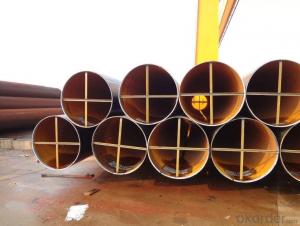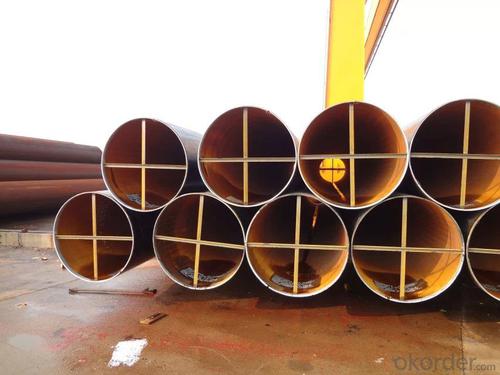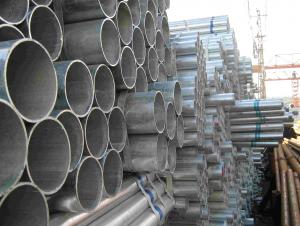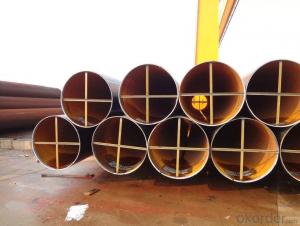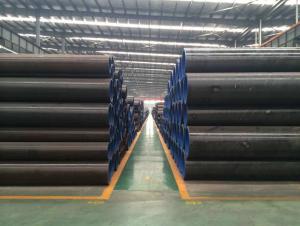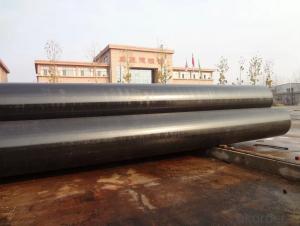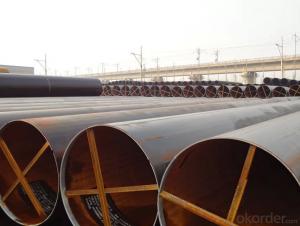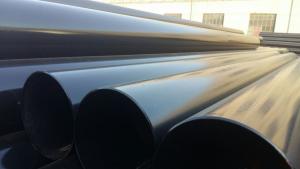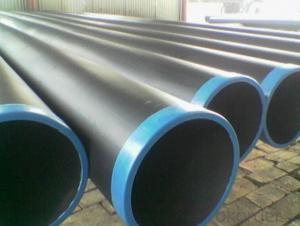Large Diameter Longitudinal Submerged Arc Welded Pipe
- Loading Port:
- Tianjin
- Payment Terms:
- TT or LC
- Min Order Qty:
- 20 m.t.
- Supply Capability:
- 11000 m.t./month
OKorder Service Pledge
OKorder Financial Service
You Might Also Like
Product Description:
1、Structure of Large Diameter Longitudinal Submerged Arc Welded Pipe:
Welded Steel Tube is widely applied to line pipe and casing and tubing in oil transportation and casing field and so on. It is formed by drawing a solid billet over a piercing rod to create the hollow shell. We are company that have many years experience and professional manager team and engineer team and sales team, sure we will provide you high quality of welded pipe and professioanl service.
2、Main Features of Large Diameter Longitudinal Submerged Arc Welded Pipe:
• High working accuracy
• High strength
• Small inertia resistance
• Strong therming dissipine ability
• Good appearance
• Reasonble price
3、Large Diameter Longitudinal Submerged Arc Welded Pipe Specification:
Standard | GB, DIN, ASTM ASTM A106-2006, ASTM A53-2007 |
Grade | 10#-45#, 16Mn 10#, 20#, 45#, 16Mn |
Thickness | 8 - 33 mm |
Section Shape | Round |
Outer Diameter | 133 - 219 mm |
Place of Origin | Shandong, China (Mainland) |
Secondary Or Not | Non-secondary |
Application | Hydraulic Pipe |
Technique | Cold Drawn |
Certification | API |
Surface Treatment | factory state or painted black |
Special Pipe | API Pipe |
Alloy Or Not | Non-alloy |
Length | 5-12M |
Outer Diameter | 21.3-610mm |
Grade | 20#, 45#, Q345, API J55, API K55, API L80, API N80, API P110, A53B |
Standard | ASME, ASTM |
1) Material:20#(ASTM A 106/A53 GRB.API5LGRB,GB),45#,16Mn,10#.
2) Specification range:OD:21.3-610mm,WT:6-70mm,length:6-12m or according to the requirement of clients.
3) Excutive standards:GB,ASME API5L.ASTM A 106/A53,Despite of the above standards,we can also supply seamless steel pipe with standard of DIN,JIS,and so on,and also develop new products according to the requirements of our clients!
4) Surface:black lacquered,varnish coating or galvanized.
5) Ends:Beveled or square cut,plastic capped,painted.
6) Packing:bundles wrapped with strong steel strip,seaworthy packing.
4、Packaging & Delivery
Packaging Details: | seaworthy package,bundles wrapped with strong steel strip |
Delivery Detail: | 15-30days after received 30%TT |
5、FAQ of Welded Steel Tube:
①How is the quality of your products?
We have many years business experience in this area, and we have professional engineer and manager team and sure we can provide you high quality production and professional service.
②How about price?
Please trust the quotation we would give you, it is professional one.We quote as lowest as possible for any customer.Don't waste your time if you are not agree with our price.
③Why should you chose us?
Our service formula: good quality+good price+good service=customer’s trust. We will do our best to provide you good service.
6、 Large Diameter Longitudinal Submerged Arc Welded Pipe Images:
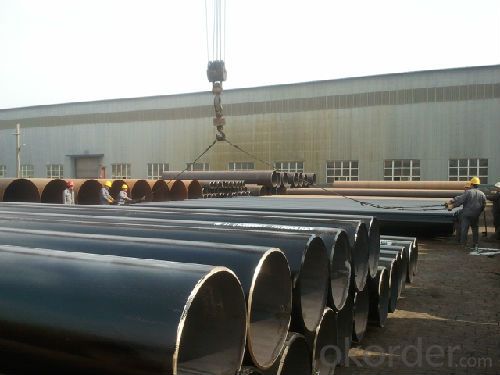
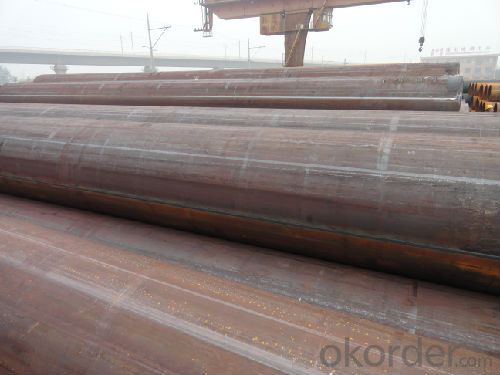
- Q: What is the minimum temperature that steel pipes can handle?
- The minimum temperature that steel pipes can typically handle is around -45 degrees Celsius (-50 degrees Fahrenheit).
- Q: What are the different types of steel pipe connections?
- There are several types of steel pipe connections, including threaded connections, welded connections, flanged connections, and grooved connections.
- Q: How are steel pipes coated to prevent corrosion?
- Steel pipes are coated to prevent corrosion using various methods and materials. One common method is applying a protective layer of paint or epoxy on the surface of the pipe. This coating acts as a barrier between the steel and the external environment, preventing moisture and corrosive substances from coming into direct contact with the metal. Another technique involves using a process called galvanization, where the steel pipes are coated with a layer of zinc. Zinc is highly resistant to corrosion and acts as a sacrificial anode, meaning it will corrode in place of the steel if any damage occurs to the coating. This sacrificial protection ensures that the steel remains intact and corrosion-free. Additionally, steel pipes can be coated with polyethylene or polypropylene materials through a process called fusion bonding. In this method, the plastic material is melted onto the steel surface, creating a strong bond that provides excellent resistance against corrosion. This type of coating is commonly used in offshore and underground pipelines. Furthermore, another technique for preventing corrosion is the application of a layer of corrosion-resistant alloy onto the steel pipe. This alloy is typically a combination of metals such as nickel, chromium, and molybdenum, which provide superior protection against corrosion in harsh environments. Overall, the choice of coating method depends on various factors such as the operating conditions, the type of corrosive substances present, and the expected lifespan of the steel pipes. By effectively applying these coatings, steel pipes can be safeguarded against corrosion, extending their durability and ensuring the integrity of the infrastructure they are used in.
- Q: What are the advantages of using steel pipes in the manufacturing of storage tanks?
- There are several advantages of using steel pipes in the manufacturing of storage tanks. Firstly, steel pipes are known for their strength and durability, making them suitable for holding large volumes of liquids or gases. They can withstand high pressure and extreme weather conditions, ensuring the longevity of the storage tank. Additionally, steel pipes are resistant to corrosion, which is crucial for preventing leaks or contamination of the stored materials. Moreover, steel pipes can be easily welded, allowing for efficient and precise construction of storage tanks. Finally, steel pipes have a high recyclability rate, making them an environmentally friendly choice for storage tank manufacturing.
- Q: Which is better, galvanized steel pipe or stainless steel?
- Stainless steel is good.Stainless steel (Stainless Steel) is referred to as the stainless steel, the resistance of air, steam, water and other weak corrosive medium or with stainless steel known as stainless steel; while the resistance to chemical corrosion (acid, alkali and salt chemical etching) corrosion of steel called acid resistant steel. Because of the difference in the chemical composition of the two, and make their corrosion resistance is different, ordinary stainless steel is generally not resistant to chemical medium corrosion, and acid resistant steel are generally stainless steel.
- Q: Can steel pipes be used for fencing or railing?
- Yes, steel pipes can definitely be used for fencing or railing purposes. Steel pipes are known for their durability, strength, and resistance to corrosion, making them a popular choice for construction projects like fencing and railings. They provide a sturdy and long-lasting solution for securing properties or creating barriers, while also offering an aesthetically pleasing and modern look.
- Q: What is the outer diameter and wall thickness of DN40 steel pipe?
- DN40, refers to the diameter of 40mm, that is, an inch and a half, there are welded pipe and galvanized pipe,Ordinary wall thickness 3.5mm wt 3.84kg/mThicken 4.25mm weight 4.58kg/m
- Q: How are steel pipes used in the construction of oil refineries?
- Steel pipes are extensively used in the construction of oil refineries as they are strong, durable, and resistant to corrosion. These pipes are used for various purposes such as transporting crude oil, refined products, and various chemicals within the refinery. They are also utilized in the construction of the refinery's infrastructure, including the fabrication of storage tanks, process equipment, and piping systems that connect different units and sections of the facility. Overall, steel pipes play a crucial role in maintaining the integrity and efficiency of oil refineries.
- Q: How are steel pipes used in the manufacturing of ships?
- Steel pipes are used in the manufacturing of ships for various purposes such as constructing the hull, supporting structural components, and facilitating the transportation of fluids and gases within the vessel.
- Q: What are the common grades of steel used in pipes?
- The common grades of steel used in pipes include ASTM A53, ASTM A106, and API 5L.
Send your message to us
Large Diameter Longitudinal Submerged Arc Welded Pipe
- Loading Port:
- Tianjin
- Payment Terms:
- TT or LC
- Min Order Qty:
- 20 m.t.
- Supply Capability:
- 11000 m.t./month
OKorder Service Pledge
OKorder Financial Service
Similar products
Hot products
Hot Searches
Related keywords
